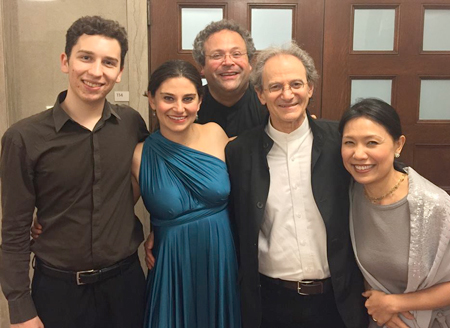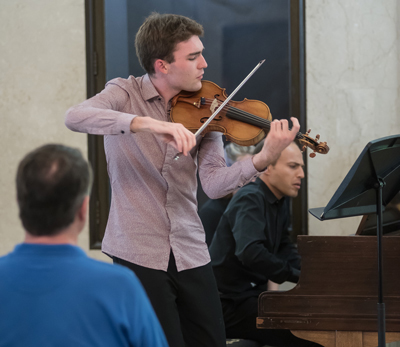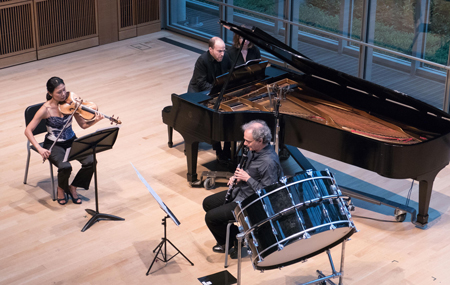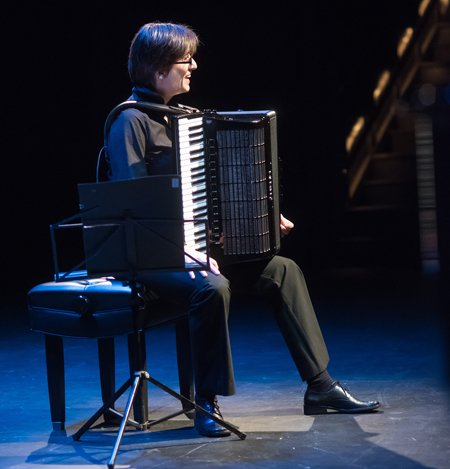by Neil McCalmont

After more than a dozen thrilling concerts, the festival’s fifth season has come to a close. Though the number of artists and performances has grown since its 2012 inception, ChamberFest still holds this mission at its core: “To nurture a deep family-like connection between musicians and audiences of all ages.”
The father-daughter duo of Franklin and Diana Cohen founded and co-direct ChamberFest Cleveland. Diana is concertmaster of the Calgary Philharmonic Orchestra, her father the principal clarinet emeritus of The Cleveland Orchestra. They set out to found a festival — partly inspired by their experiences at the Marlboro Music Festival — with the goal of “great players, great music-making, and great community.”
“There are so many variables that you would never anticipate,” Diana said in an interview. “The easy part is collecting friends and having them perform. The hard part is creating a board, getting donors, and working on publicity. The list goes on and on.” Establishing a new festival in the music industry may be an arduous task, but the Cohens had resources to draw on, like the late Jamie Ireland. “He was on the board of all of the big cultural institutions in Cleveland, so he knew what to do, and he was always one step ahead of me.”
A particularly difficult aspect of planning any musical event is choosing the repertoire. As accordionist and composer Merima Ključo, a ChamberFest newcomer, explained, “Programming is a very special talent — you have to know if the pieces will work for both the performers and the audience. I imagine it’s the same as writing about a composition: you have to think about it for months and months.”
Part of ChamberFest’s reputation rests on their out-of-the-box programs, from interspersing works of Haydn and Gubaidulina, to having a pianist improvise to a silent film. “The ability to do productions with puppets or with a ghost opera gives the Festival the spice that makes it feel like it’s truly ours,” said Diana.
The musicians play a collaborative role in the programming decisions and commissions. This season, the Festival commissioned a work from Merima Ključo. “This was the first time I wrote for clarinet and accordion, and to have a premiere of your own piece is always exciting!” she exclaimed.
Once the business end has been taken care of, rehearsals can begin. Many of the musicians stay with the Cohens or with host families down the street. “At home, I hear ensembles reading music until 1 in the morning,” Frank said, laughing. “We spend a lot of time together. The other night, violinists Yura Lee and Alexi Kenney prepared a delicious Korean dinner for everyone. I just feel very lucky.”

Pianist Orion Weiss, a longtime friend of the Cohens, added his own thoughts. “As a musician, you have to open your heart a little bit and connect with people, especially in chamber music. So we’re all friends. You have all these musicians having fun together and immersing themselves in a joyous, non-stressful way, which makes for wonderful performances. If you enjoy playing with someone, you listen to them more, just like when you’re talking to someone. You have to pay attention to what everybody ‘says’ in their music.”
Ključo had this to say about the qualities of ChamberFest musicians: “They all have this energy that they were born with. They want to be musicians. It’s not really explainable. They have an extreme dedication to their instruments and the music — and huge discipline — that’s what music teaches you.”

Not the least among ChamberFest’s goals is to foster a strong sense of community and share its music with as many people as possible. That comes to fruition in different ways. It’s not unusual for Frank to hop on his bike to hit up local bars and cafés with ChamberFest pamphlets to broaden the festival’s audience. And he doesn’t mind breaking down the fourth wall at concerts. Having forgotten his reading glasses, he once canvassed a Mixon Hall audience looking for a pair. The audience was delighted to help.
Technical prowess, fierce dedication, and the cultivation of friendships all contribute to ChamberFest’s captivating concerts, which keep audiences coming back season after season. Diana summed it up nicely: “The ability to connect with people in a deep way through music is the most important thing for a musician.”
We eagerly await furthering that connection again next summer.
Published on ClevelandClassical.com August 4, 2016.
Click here for a printable copy of this article





